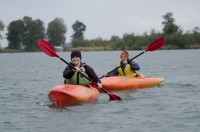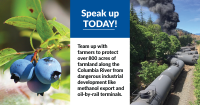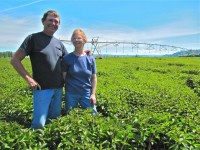Riverkeeper Teams with Farmers, Rural Communities to Protect Farmland from Fossil Fuel Development
Riverkeeper is working with farmers and Columbia County, OR, residents to fight a controversial effort to open over 800 acres of high-quality farmland along the Columbia River for industrial development, including methanol and oil-by-rail terminals. We stopped the proposal before. Now we need your help to put this bad idea to bed forever.
What’s at Risk?
The Port of St. Helens wants to lift protections on farmland to allow for fracked gas-to-methanol refineries, oil-by-rail, and other industrial development. This is the wrong place and the wrong time to invest in fossil fuel infrastructure. The Columbia River estuary is home to communities that rely on clean water and strong salmon runs. High-impact fossil fuel development undermines decades of hard work—and billions of dollars of taxpayer money—to recover endangered salmon and combat climate change.

One year ago, Oregon received a fiery wakeup call when an oil train derailed in Mosier. Columbia County should take note. Railroad tracks servicing Port Westward cut through Columbia County communities, including multiple at-grade crossings. The rezone would facilitate increased rail traffic to Port Westward at the expense communities along the rail line.
Oil-by-rail is one of several fossil fuel developments at issue in the rezone. Northwest Innovation Works proposes two methanol refineries in the Northwest: one in Kalama, WA, and the other at Port Westward—likely on the rezoned farmland. The two refineries would tie for the title of World’s Largest Methanol Refinery and consume a stunning amount of fracked gas and fresh water. Methanol and oil terminals were referenced by the port as potential tenants if the rezone succeeds.
You can protect farms and important salmon habitat:
- CALL County Commissioners Margaret Magruder, Henry Heimuller, and Alex Tardif today (503-397-4322). Ask them to vote “no” on the Port Westward rezone and to protect salmon habitat and farmland.
- ATTEND the public hearing on the proposed rezone at 6:00 p.m. on August 2, 2017, at the Clatskanie High School Auditorium, 471 SW Bel Air Drive, Clatskanie. Public testimony will be accepted.
- SUBMIT A PUBLIC COMMENT!
The Backstory
In 2013, the Port of St. Helens proposed nearly doubling the size of its Port Westward industrial property for projects including coal export and oil-by-rail. Columbia County approved the rezone and Columbia Riverkeeper, represented by the Crag Law Center, appealed. In 2014, local farmer and business owner Mike Seely also challenged the County’s decision. The Oregon Land Use Board of Appeals (LUBA) rejected the Port’s argument that the area needs more industrial-zoned land to thrive. Here are highlights of LUBA’s decision:
- The County must re-evaluate the application and issue a new decision on the proposal.
- As part of its review, the County must analyze and explain why the vacant land at the existing Port Westward site and other sites around the County cannot accommodate new industrial uses.
- The County must also identify a close, direct relationship between the reasons given for expanding the industrial park, and the proposed uses of that land.
- The County may not defer analysis of adverse impacts of the proposal to a later time, but instead must evaluate those impacts before approving the Port’s proposal.
- The County must evaluate whether the proposed industrial uses will be urban or rural in nature, and limit uses to rural uses.
In response to LUBA’s decision, the Port of St. Helens submitted a revised application in April 2017. The Port’s application suffers from many of the fatal flaws LUBA identified in the first application.
Resources:
Historic Documents:
- Press release announcing our victory at the Land Use Board of Appeals
- Read Riverkeeper’s 2013 legal comments outlining our concerns about the rezoning of agricultural land to industrial use at Port Westward.




